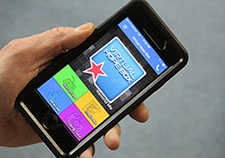Office of Research & Development |
 |

VA Research Currents archive
November 30, 2016

The Virtual Hope Box app is a "demonstrably useful accessory to treatment," concluded VA and Department of Defense researchers who tested it in a controlled trial. (Photo by Mitch Mirkin)
Researchers have shown in a randomized controlled trial that a U.S. government-developed smartphone app can help Veterans cope with stress and unpleasant thoughts, including those that could lead to suicide.
Experts with the VA Portland Health Care System led the controlled trial of the app—called the Virtual Hope Box (VHB)—which was built by a team at the National Center for Telehealth and Technology of the Department of Defense and has been available for download since 2014.
The study by three VA and three DoD investigators, published online November 2016 in Psychiatric Services, found that Veterans who used the application reported a much greater ability to cope with unpleasant emotions and thoughts after 3 and 12 weeks, compared with a control group of former military members. The Veterans who used the app also reported a greater likelihood to use it in the future, compared with how the control group felt about using written educational materials.
"The Virtual Hope Box can be a useful accessory to mental health treatment."
The Virtual Hope Box provided no notable advantage in treatment for other outcome measures, such as enlisting support from family and friends.
Researchers for the study included Drs. Steven Dobscha and Lauren Denneson, as well as Holly Williams, of the Center to Improve Veteran Involvement in Care (CIVIC) at the VA Portland Health Care System.
"The VHB can be a useful accessory to mental health treatment," says Dobscha, who heads CIVIC. "Because the app can be easily disseminated across a large population and can be easily accessed by users, there is potential for it to have broad effectiveness in behavioral health care."
The Virtual Hope Box was designed for use by patients at elevated risk of suicide or self-harm, and their behavioral health providers. It contains items that serve as reminders of positive life experiences or reasons for living, as well as simple tools to help patients with coping, relaxation, and distraction. Patients and providers can collaborate to personalize the content by selecting audio, video, pictures, games, mind exercises, and inspirational quotes.
Since its introduction to the public in February 2014 through October 2016, the Virtual Hope Box has tallied nearly 180,000 downloads, about two-thirds for iPhone and the rest for Android. It's available for free through the Apple App Store and Google Play.
The joint study involved two groups of Veterans in mental health treatment at a VA facility who had recently expressed thoughts of committing suicide.
Of the 118 participants, 58 used the Virtual Hope Box and the other 60 were in a control group that received printed materials about coping with distress and suicide to supplement their mental health treatment. The most commonly cited reasons for using the app were to control distress (69 percent of respondents) and overwhelming emotions (57 percent); for relaxation, distraction and/or inspiration (51 percent); and for times the Vets felt like hurting themselves (31 percent).
Data from interviews further suggested that clinicians appreciated the app's capacity to serve as a therapeutic tool, and that it reinforced the patients' existing coping skills and gave them an outlet to practice those skills.
"We designed VHB to serve as a collection of tools that can aid with stress and distress, and that can help people restore emotional balance," Dobscha says. "In the clinical arena, we believe that the app can be used by patients to supplement ongoing treatment while away from the clinic. VHB allows patients to practice coping techniques and strategies that are often taught as part of mental health treatment."
Dobscha, a psychiatrist, says he has been working with VA's National Mental Health Services and Connected Care offices to disseminate information about the Virtual Hope Box to VA facilities around the country.
Suicide prevention is one of VA's top priorities. The Centers for Disease Control and Prevention said there were more than 41,000 suicides in the U.S. in 2013, or 113 each day. About 20 percent of those who commit suicide are Veterans.
Veterans can be at risk for suicide for various reasons. Some are coping with aging, stress, or lingering effects stemming from their military service that have never been addressed. Many have underlying mental health conditions, in some cases aggravated by their military service, that increase risk. Plus, many recently discharged Veterans have difficulty with their relationships or their transition back to civilian life.